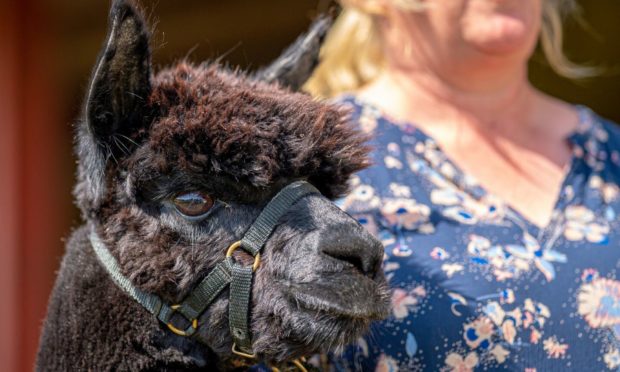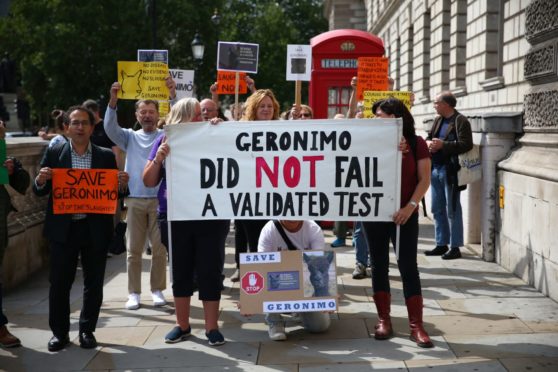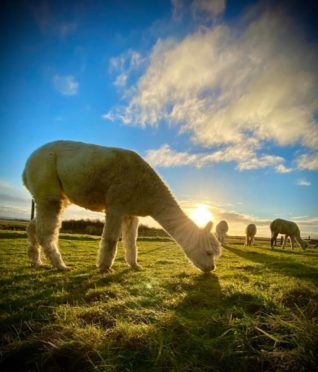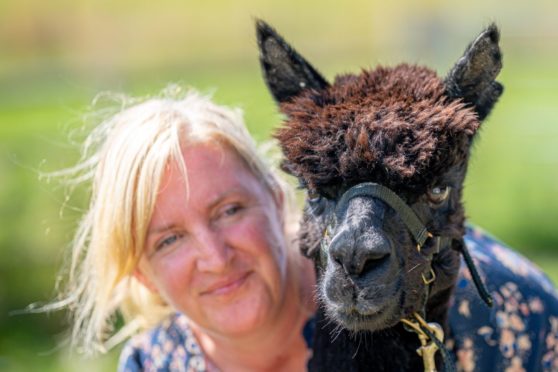All eyes are on Geronimo as the six-year-old alpaca’s death sentence looms.
Protestors descended upon Downing Street on Monday, August 9, to fight against the Department of Environment, Food and Rural Affairs’ (Defra) decision to euthanise the animal.
Geronimo’s fate was decided after he tested positive for bovine tuberculosis twice four years ago.
However, there is debate as to whether the results are accurate, as they are taken after the animal has been injected with the disease.
His owner, Helen Macdonald says the tests resulted in false positives and is asking for him to be tested a third time.
The government has denied this request and has said that it is still the intention for the alpaca to be killed.
‘The facts are simply not there’
Imants Schneider and his wife own Highland Alpacas, an alpaca farm in Balmedie, Aberdeenshire.
Together, they have 49 alpacas.
Mr Schneider said he was concerned about the misinformation and “inadequate” facts that have been spread surrounding Geronimo’s situation.
He said: “People form opinions based on what they see, what they hear and they run away and tell the world.
“The facts are simply not there.”
He explained how the tests, done on Geronimo four years ago, work.
“Basically, with these tests, you’re injecting the tuberculin into the animal.
“But if you take a blood sample from the animal then, surely, you’d expect to find something there because you put it in.”
He also claimed that even the manufacturers of the tests said they were not a reliable way of proving whether or not an animal has bovine tuberculosis.
‘If he did have TB he should be put into the history books’
The government has said that no further tests will be carried out on Geronimo despite pleas from both his owner and now the wider public who have been touched by his story.
Mr Schneider believes they should be basing their decisions on science, as they have consistently stressed throughout the pandemic.
He said: “We hear them saying it so much with Covid, ‘We’re following the science, we’re following the science.’ We’re sick to death of hearing it, but when it comes to Geronimo, they’re not following the science.
“They’re following legal elements because the High Court ruled against it. Where’s the science and real evidence that what they’re trying to achieve is actually valid?”
The alpaca farmer highlighted the fact that, if Geronimo had tested positive for the disease four years ago, his chances of still being alive now would be more than slim.
He said: “He would not be alive. If he did have TB he should be put into the history books as a marvelous animal that has survived something that kills.”
Voluntary testing
Geronimo’s story has had a negative effect on the alpaca farming community.
Members of the community were previously in favour of voluntary testing, all with the common understanding that it would benefit the alpaca population as a whole.
However, this situation has made them fear for the lives of their animals.
Mr Schneider said: “We were all for partaking in the voluntary testing but because of what’s going on now we’ve all basically turned around and said ‘Well, forget that mate.’
“We’re not going to expose ourselves to the regime of a government body that is not reliable and can cause all this heartache and upset.”
‘The story is certainly not over’
Mr Schneider said that people who keep alpacas rarely do so for any commercial reasons, but instead because they love them and want to care for them.
Geronimo’s story has acted as a “catalyst” for a wider conversation.
Mr Schneider said: “The matter is now way beyond the principle of one animal, one TB case, one owner – it’s now irrelevant.
“It’s now the actual principle of what’s going on with the government body, Defra, and how it’s handling the situation.
“If they move in now and shoot this animal, there’s going to be uproar. When it comes to the post-mortem and they say ‘Oh well, sorry, he doesn’t have it.’ What’s going to happen then?”
He hopes that the outcome of Geronimo’s situation, whatever it may be, brings about positive change, and not only in the alpaca farming community.
Cattle are frequently killed after testing positive for tuberculosis, something which Mr Schneider believes farmers will refuse to stand for if Geronimo is allowed to live.
He said: “Farmers are going to be upset about it. How can one alpaca be saved and their 500 animals get put to sleep?
“I think what we can safely say is that what is going on with Geronimo now is a catalyst for something that is going to end in major changes in policy, in protocol, in science.
“The story is certainly not over, and I don’t think it’s going to be over for a long time yet.”



